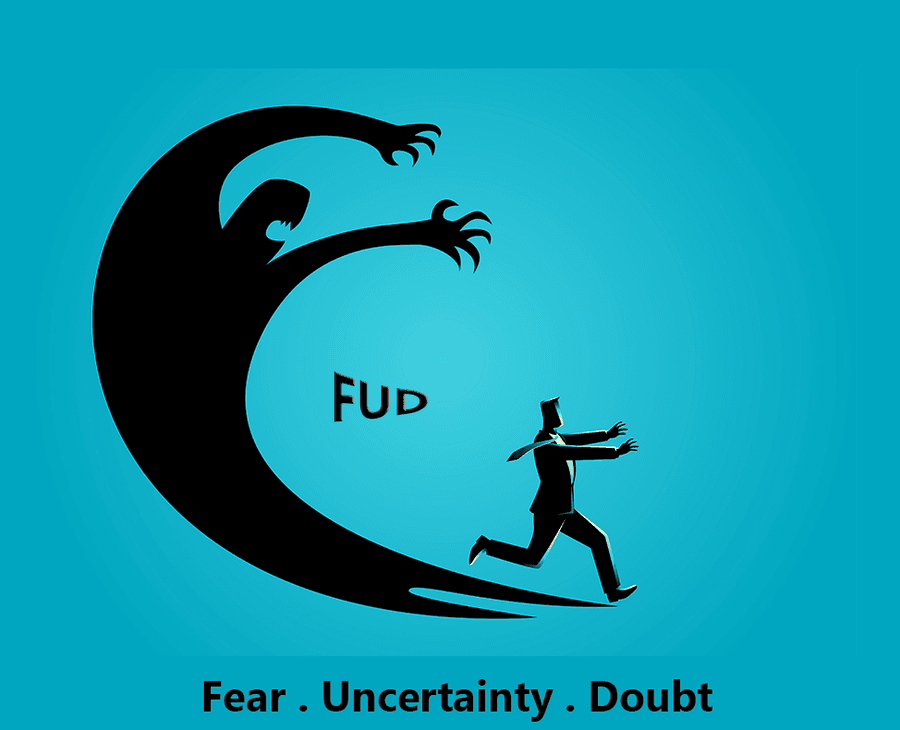FUD: Fear, Uncertainty, and Doubt - Effectiviology
Curated from: effectiviology.com
Ideas, facts & insights covering these topics:
9 ideas
·1.75K reads
18
Explore the World's Best Ideas
Join today and uncover 100+ curated journeys from 50+ topics. Unlock access to our mobile app with extensive features.
FUD: Fear, Uncertainty, Doubt
- FUD (fear, uncertainty and doubt) is a collection of feelings and emotions that influence our thinking.
- It was coined by Gene Amdahl, who worked at IBM and later founded his own company.
- Business, media, politics and even some religions use FUD intentionally, as they understand its power and how vulnerable people are to it.
- Marketers and salespeople often exploit these behaviour patterns in people and manipulate them by planting doubts and uncertainties about a competing product or service in their minds.
85
370 reads
FUD Usage In Tech Companies
Various tech companies use fear, uncertainty and doubt (FUD) to control customer behaviour. They plant fake news, confusing press releases and benchmark tests to influence the decisions of prospective customers.
Example: Announcing ‘vaporware’ products, something that isn’t even in existence, just to harm the sales of the existing products of competitors.
72
269 reads
Amplifying The FUD
Customers are often pushed towards a particular product due to marketers amplifying the FUD (fear, uncertainty, doubt) state.
- They claim the product is backwards compatible, or is fully compatible with a variety of hardware, implying that the competitor's product isn’t.
- They claim that their product requires minimal training of employees.
- They try to sell the worth of the product by claiming that millions of customers use it.
- They try to hasten the decision by giving limited time discount offers.
- They play the ‘limited stocks’ game or suggest how others have benefited from the same.
77
179 reads
FUD: Propaganda Tool
Instilling fear, uncertainty and doubt in the minds of people isn’t new. Governments and political groups have been fearmongering for centuries.
Most mainstream media carries a certain narrative or agenda in their news reporting, promoting the feelings of FUD in readers in order to coax them into buying the publication, clicking the article link, or simply believing the propaganda.
72
184 reads
How FUD Is Created And Used
Spread intentionally and unintentionally, FUD (fear, uncertainty and doubt) techniques are quite common. Some of the most utilized techniques to create or amplify FUD among people are:
- Making negative statements about a rival.
- Pushing the narrative on possible negative results, while exaggerating the impact or likelihood of the same.
- Amplifying people's existing negative emotions.
- Confusing them through lots of information.
- Questioning their beliefs.
- Attacking their source of information.
79
145 reads
Common Biases And Belief Patterns
FUD (fear, uncertainty, doubt) techniques use various belief patterns and cognitive biases already present in people.
- Authority Bias: People are already conditioned to believe authority figures.
- Bandwagon Effect: People often do what others are doing.
- Slippery Slope Argument: Suggesting that a certain action can set off extreme results, pushing us towards the wrong path.
- Appeal To Emotions: Most manipulators appeal to our fears, exploiting our emotions for their gain.
- Reverse Psychology: Indirectly coaxing people to do the opposite.
79
131 reads
How To Deal With FUD
We first need to identify the various fears, uncertainties and doubts (FUD) we have in ourselves, trying to resolve them when we know what they are and from where they are coming from.
One can deploy the principle of cui bono, asking yourself ‘who benefits?’ from this FUD being created in you. Likewise, various cognitive biases can be dissected.
Keep in mind that people often believe what they hear, and only object towards something wrong if they have full knowledge of the same and can therefore identify the error.
76
148 reads
Reducing FUD In Other People
- Be clear and objective about your product or service and what the features are.
- Answer common questions through a collection of Frequently Asked Questions (FAQs).
- Offer demos so that customers can themselves make up their minds about your service or product.
- Having customer testimonials and a good website also helps in reducing FUD, also known as the halo effect.
73
154 reads
IDEAS CURATED BY
Charlie 's ideas are part of this journey:
Learn more about psychology with this collection
How to find purpose and meaning in life
How to cultivate gratitude
Techniques for managing negative thoughts
Related collections
Similar ideas
Read & Learn
20x Faster
without
deepstash
with
deepstash
with
deepstash
Personalized microlearning
—
100+ Learning Journeys
—
Access to 200,000+ ideas
—
Access to the mobile app
—
Unlimited idea saving
—
—
Unlimited history
—
—
Unlimited listening to ideas
—
—
Downloading & offline access
—
—
Supercharge your mind with one idea per day
Enter your email and spend 1 minute every day to learn something new.
I agree to receive email updates


